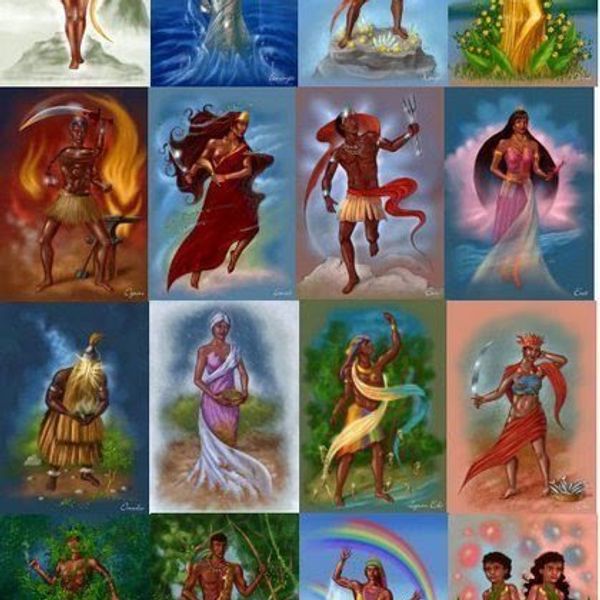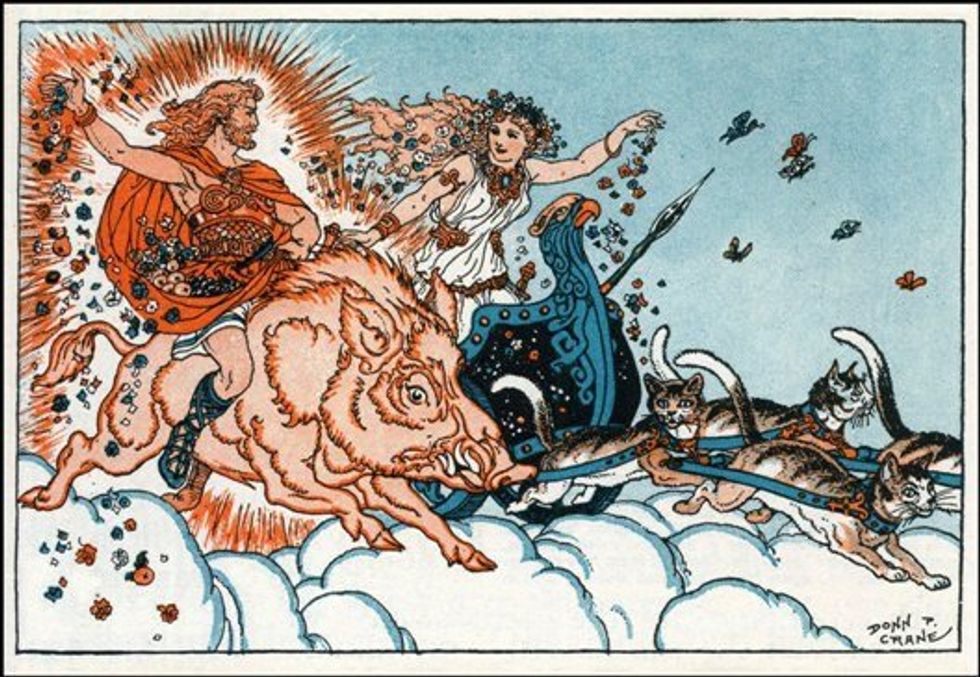It is now time to get into the individual gods and their influences. I figured I would start with the Vanir twins Frey and Freyja since they're relatively simple and tie into the events of the Aesir/Vanir war, which I just wrote about. I will still be referencing the same Poetic and Prose Eddas, translated by Bellows and Byock, respectively.
Origins
The twins come into the mythology during the Aesir/Vanir war. Freyja, under the alternate name Gollveig, incites mistrust between the Aesir and the Vanir. She's burned three times and reborn each time. While Frey, along with their father Njord, were sent to the Aesir as part of a peace offering. In technicality Frey, Freyja, and Njord are hostages.
Frey
37. Of the heroes brave | is Freyr the best
Here in the home of the gods;
He harms not maids | nor the wives of men,
And the bound from their fetters he frees.
(Bellows 163-64)
Frey is seen as one of the noblest of the gods. He "is the most splendid of the gods. He controls the rain and the shining of the sun, and through them the bounty of the earth. It is good to invoke him for peace and abundance. He also determines men's success in prosperity" (Byock 35). Thus, Frey is associated with being a fertility god as well as a god of prosperity.
Frey owns/owned some interesting things. As I mentioned in my overview of the nine worlds, Frey was given Alfheim as a teething gift, but this is not the end of his artifacts. First is his ship Skithblathnir, "The best of ships | for the bright god Freyr,/ The noble son of Njorth" (Bellows 101). Skithblathnir is interesting in that it can be folded up and put into his pocket when he's not using it. Then there is his magic sword "that will fight of itself/ If a worthy hero wields it" (Bellows 110). Frey gives this sword to his servant, Skirnir, in exchange for helping him woo and court his wife, a beautiful giantess named Gerd or Gerth. Last of his treasures is Gullinbursti, the boar of golden bristles. Made by the famous dwarves Eitri and Brokk (who are responsible for many of the gods' treasures), the boar can "race across the sky and over the sea better than any other mount" and the boar's bristles would shine brightly even in darkest and murkiest night (Byock 93).
Frey is an interesting god. His name meaning "lord" and the constant assertion that he is the best of the gods can make one think that he is above Odin, the All-Father. But, Odin and Frey are entirely different in both their motivations and their power. Frey may be splendid and have major clout with mortals, but Odin rules in a much more subtle way. I will get to this more when I talk about Odin, but Frey is a "man's man", so to speak. He exudes prosperity and bounty, so of course he's a popular guy.
Freyja
Pronounced with the soft J, Freyja is equatable to Aphrodite. Like her brother, "Freyja is the most splendid of the goddesses" (Byock 35). She is associated with fertility and "it is good to call on her in matters of love" (Byock 35). She is as well associated with gold, sexuality, beauty, the honored dead, and seidr. Seidr is a form of organized magic practiced by the ancient Norse. It was first taught to the gods by Freyja after the first war.
Just as her brother has a few interesting things, so does she. Freyja has her own hall, Sessrumnir, which "is large and beautiful" and rides a chariot "drawn by two cats" (Byock 35). She also owns the necklace Brisingamen, which is not stated to have any special qualities other than that it shines brightly. Brisingamen may have just been a mark of status. Freyja has a husband named Odr, who is supposedly just a man.
14. The ninth is Folkvang, | where Freyja decrees
Who shall have seats in the hall;
The half of the dead | each day does she choose,
And half does Othin have.
(Bellows 90-91)
The most prominent area of control that Freyja has is Folkvangr. Folkvangr, as the quote above says, is where half of the slain go. The other half goes to Odin's hall, Valhalla, the more well known hall of the slain. Folkvangr is much like Elysium; a great field or meadow to spend the rest of your days in. Freyja's hall is supposed to be in Folkvangr as well. Nothing that I have found states what goes on there, unlike Valhalla, which source materials are quite explicit on.
Freyja's name is the counterpart to Frey's, where her's means "lady". It has been suggested by some scholars that Freyja is none other than Frigg, Odin's wife, called by a different name. But, if one is to go strictly by the source material, it can be hard to make that assumption, since Freyja talks about Frigg as an entirely different entity. The reasoning behind claiming that Freyja is the same as Frigg stands on three main parts: her husband, seidr, and Folkvangr. Her husband, Odr, is said to be Odin going by a different name, which is plausible since he has hundreds of names. The two also apparently share some similarities. Frigg is closely associated with the practicing of seidr and is even able to see the future of both gods and men, though she never shares it. And lastly, the fact that Freyja would have Folkvangr and get half of the dead doesn't make logical sense to some. This is coming from a honor and rank value of logic, meaning, why would Freyja, a Vanir hostage, get half the slain over Frigg.
As for myself, I tend to stick with the traditional view of things. Evolutions of names and meanings and such just mean that the now popular way of seeing these gods is accurate.
Thoughts
I call these two the Great Twins. They're useful and easily approachable gods that mortals have had good fortune with for centuries. In fact, the Prose Edda even states that Freyja is "easily approachable for people who want to pray to her" (Byock 35). As I cover more gods it will be easier to see how particular each can be for an aspect of someone's life. Even Odin, who is essentially the jack-of-all-trades for the Norse gods, has his own areas of expertise.
Keep prospering, my friends.





















